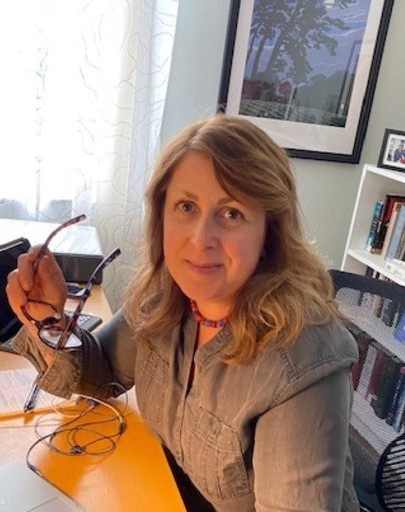
Cincinnati.com: Ohio decriminalized fentanyl test strips. Here's why experts say that matters
UC expert says a vast majority of people who use the test strips changed their drug use behavior
Public health agencies and advocates in Ohio will no longer be breaking the law when they hand out potentially life-saving fentanyl test strips. Cincinnati.com reported that Governor Mike DeWine signed a bill into law Jan. 3 decriminalizing the paper test strips that detect fentanyl and its analogues in drugs. The law takes effect sometime in April. Tasha Turner-Bicknell, director of public health nursing programs at the UC College of Nursing was one of the experts interviewed for the story.
Turner-Bicknell, a board member of Harm Reduction Ohio, told Cincinnati.com it's about time this happened, because the detection strips are a life-saving strategy during an agonizing overdose death epidemic.

Tasha Turner-Bicknell of the UC College of Nursing
The agencies and other groups that handed out the strips weren't being prosecuted, and most people using them weren't charged. But advocates say the law is a step in the right direction in addressing the opioid epidemic.
The Centers for Disease Control and Prevention cleared the way for federal grant money to be used for fentanyl test strips in April 2021. Criminalizing fentanyl test strips also fueled stigma against people who use drugs, said Turner-Bicknell. A lot of people question whether such tools have any impact on people who use drugs, she said.
Turns out, they do. A vending machine outside nonprofit Caracole in Cincinnati's Northside neighborhood offers fentanyl test strips along with Narcan, safe-smoking kits and other "safe-use" products. And surveys from those who use the machine show that fentanyl test strips are making a difference.
"The surveys show that 85% of people who used fentanyl test strips said they changed their behavior with drugs by using these," Turner-Bicknell said. "People who use drugs will use the tools at their disposal to make decisions to protect their health."
Next Lives Here
The University of Cincinnati is classified as a Research 1 institution by the Carnegie Commission and is ranked in the National Science Foundation's Top-35 public research universities. UC's graduate students and faculty investigate problems and innovate solutions with real-world impact. Next Lives Here.
Related Stories
Mural by UC grad honors U.S. military history
July 17, 2024
Local 12 highlighted a new mural by University of Cincinnati graduate and artist Brandon Hawkins that pays tribute to U.S. military history.
Social media fuels extreme political rhetoric
July 17, 2024
UC College of Arts and Sciences Professor Jeffrey Blevins tells Local 12 that online algorithms fuel political polarization on social media.
Camp aims to empower children, teens who stutter
July 17, 2024
A one-week, evidence-based program for children and teens who stutter at the University of Cincinnati will teach kids to communicate effectively, advocate for themselves and develop confidence about their communication abilities. Camp Dream. Speak. Live., which is coming to Cincinnati for the first time July 22-26, began in 2014 at the University of Texas at Austin. The Arthur M. Blank Center for Stuttering Education and Research at UT expects to serve more than 2,000 children at camps across the United States, Africa, Asia and Europe this year.
From intern to full-time: Recent Lighting Design grad joins Bandit Lites
July 16, 2024
Lighting & Sound America spotlights recent graduate Riley Rowan's new position at Bandit Lites, a full-service design, management and producer of live events and entertainment.
CCM alum Donald Lawrence to be inducted into Cincinnati Black Music Walk of Fame
July 16, 2024
UC College-Conservatory of Music alumnus Donald Lawrence is part of the 2024 class of Cincinnati Black Music Walk of Fame inductees. Located at the Banks in downtown Cincinnati, the induction ceremony on July 27 will feature a parade of stars and a free concert by the Zapp Band.
U.S. stroke survival is improving, but race still plays role
July 16, 2024
U.S. News & World Report, HealthDay and Real Health covered new research from the University of Cincinnati that found overall rates of long-term survival following stroke are improving, but Black individuals experience worse long-term outcomes compared to white individuals.
Presidential challenge to UC: Join Ride Cincinnati to fight cancer
July 16, 2024
UC President Neville Pinto has again challenged every UC college and unit to send at least one rider to the September 14 Ride Cincinnati event to help fundraise for cancer research and cancer care. UC students ride free. Signup by July 31 for free UC-branded cycling jersey.
Pediatric ICU rates linked to housing quality, income, education
July 16, 2024
Healio highlighted research led by the University of Cincinnati and Cincinnati Children's Hospital's Carlie Myers that found a link between pediatric ICU admission rates and housing quality, household income and education.
UC study: Long-term stroke survival improving, but racial disparities remain
July 15, 2024
New research from the University of Cincinnati published in the journal Neurology found long-term survival rates following acute ischemic strokes are improving, but Black individuals experience worse long-term outcomes compared to white individuals.
How to deal with workers' summer slumps
July 15, 2024
A summer slump featuring a loss in the quantity and quality of work is common, and instead of fretting about it, organizations should just roll with it, a University of Cincinnati business professor told Orlando, Florida-based WKMG's Breakfast With Bridgett. Scott Dust, PhD, the Fealy Family Chair in Entrepreneurship and an associate professor in the Department of Management at the Carl H. Lindner College of Business, said summertime changes people's psyches.
